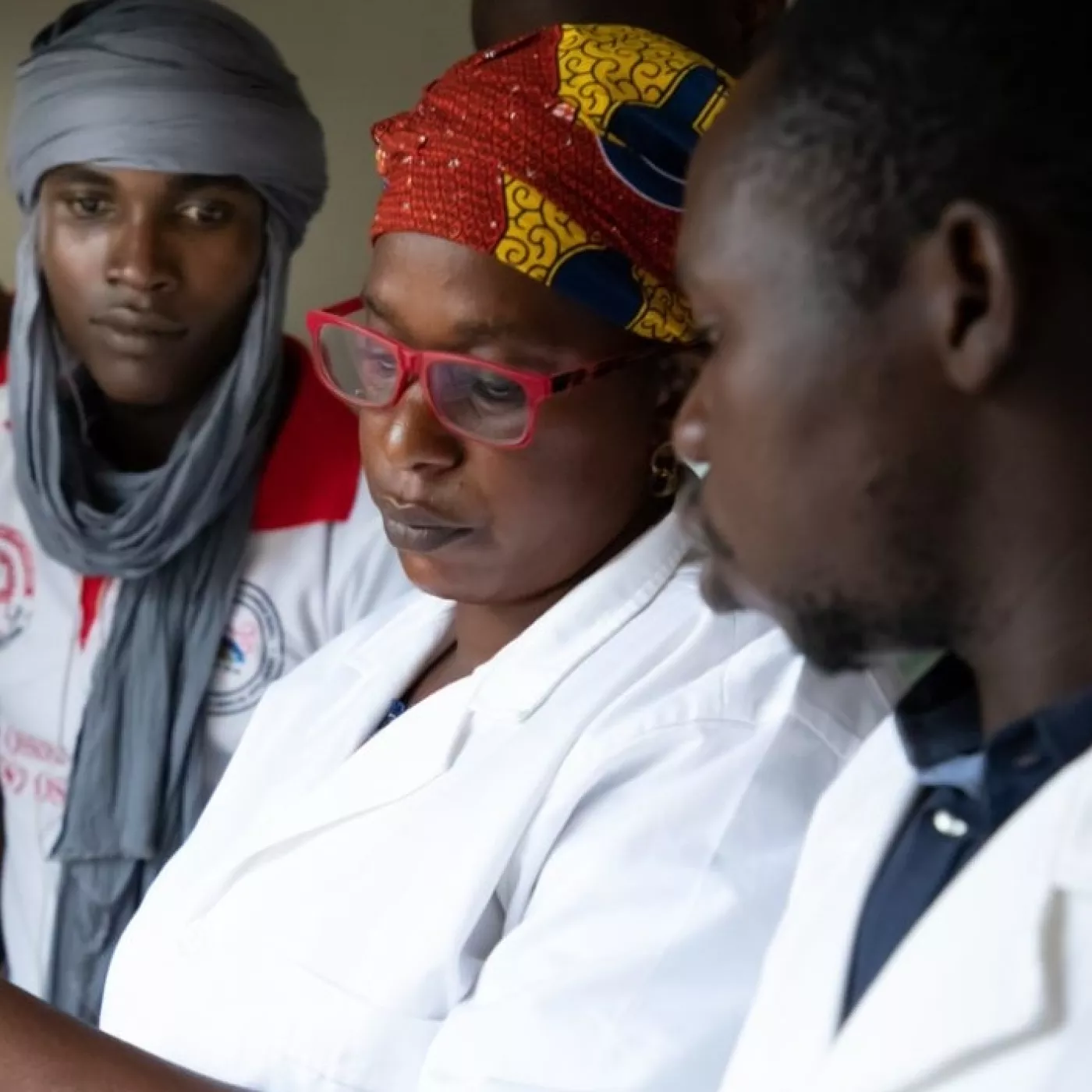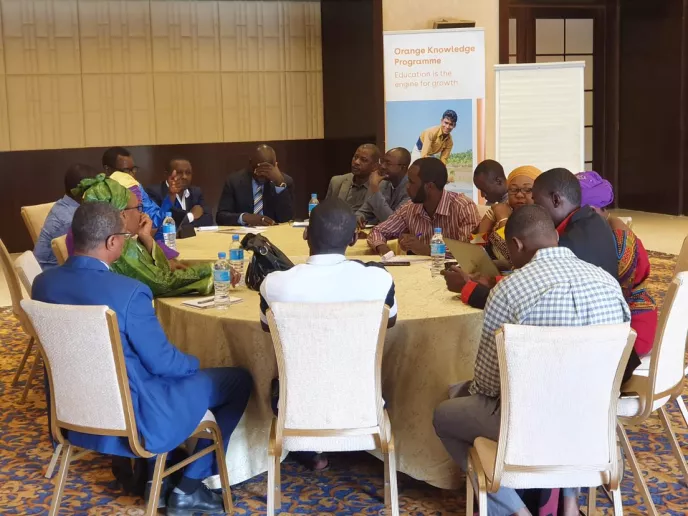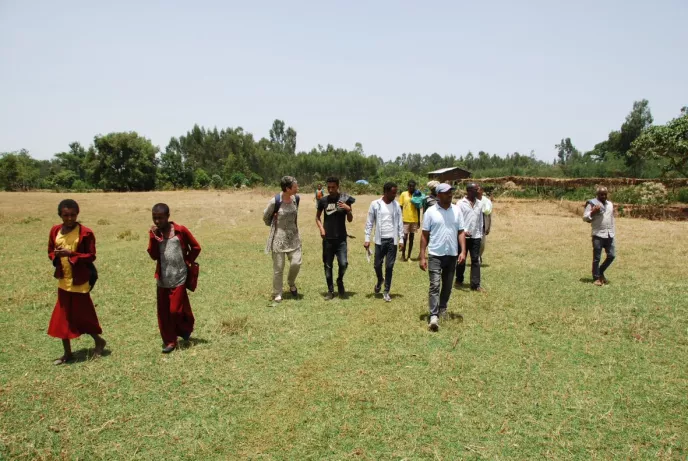Our regional approach put into practice

Sahel region: 'Finding local partners'
Joseph Junior Seh, country programme manager of various countries in the Sahel region (Mali, Niger, Burkina Faso, (North) Benin) explains: ”Our regional approach In the Sahel targets two important themes: Sexual and Reproductive Health and Rights (SRHR) and Security and Rule of Law (SRoL). Our strategy consists of strengthening the collaborative capacities of organisations in civil society, private and public sector in the sub-region, by cooperating with Dutch knowledge institutions. The advantages are numerous: pooling resources (human, financial and material), building on existing practices, exchanging knowledge and creating a framework for innovation to meet common development challenges.”
”SRHR for instance, is a very sensitive topic which is part of a bigger issue – inadequate and fragile health systems. So, there’s more at stake than only solely improving SRHR. On top of that, the COVID-19 pandemic, other health and humanitarian crises, and the quality of security and the rule of law are having a tremendous impact on these health systems. It jeopardises SRHR efforts made so far, so we need to approach it rapidly, holistically, and efficiently. By extending our understanding of the local context, unlocking local expertise, and by sharing this knowledge in the local context. The challenge is to find local partners who can collaborate in partnerships with Dutch education institutes.”
Webinar series
As one of the first actions, initiated by our new local colleague Rachade Sefou, who is representing Nuffic in the region, we launched a series of regional webinars. “We kicked off with a webinar on strengthening health systems, seen in the light of the COVID-19 pandemic”, explains Joseph. “We discussed SRHR issues, but also mental health as we observed that mental health issues are not sufficiently covered in SRHR projects.”
Take aways of the breakout sessions in the webinar were that access to SRHR services has been disrupted, that there is a concerning increase in teenage pregnancies noticeable, and the gender based violence is definitely increasing, but hard to trace as people stay in lockdown. “The advice was to rather reach out to young people with SRHR problems than wait for them to go to health clinics and recommend responsible use of contraception. This means a more proactive role is needed. For instance by using digital ways, such as using WhatsApp groups”, explains a participant from Niger.
SRHR is a very sensitive topic which is part of a bigger issue – inadequate and fragile health systems
Among the participants were thematic experts from public, private and civil society, opinion leaders and decision makers, and organisations interested in forming partnerships with Dutch institutions. Participants from various Orange Knowledge projects from Benin, Niger, Mali Burkina Faso also joined in, as well as partners from previous capacity development programme NICHE and the various Dutch organisations involved or interested to partner in this region.
“It was very interesting to see how, despite the COVID-19 health crisis and security challenges, the organisations responsible for implementing the projects were able to stand up to the challenge. They adapted to these new unforeseen elements by for instance using social media, and community radios for proximity campaigns. “Capacity building for technicians and health workers in mental health would be an option to further explore”, explains a participant from Mali.
The next webinar is planned on 30 September and will tackle the topic of cooperation in higher education and mobility of knowledge, and many more will follow.
Regional projects
End of August a regional collaboration project was kicked off virtually. The institutional collaboration project is called ‘Climate change, security & rule of law in Sahel: optimise the contribution of universities to strengthen the resilience of communities’. This project is being implemented by a consortium of universities in Mali, Niger and Burkina Faso and 3 institutions in the Netherlands, headed by Maastricht School of Management (MSM). It will develop the knowledge of the interactions between climate change, conflicts, security issues and the rule of law. At the same time, it will identify and implement measures to strengthen the resilience of communities to the effects of climate change and strengthening the rule of law.
On August 28th, we organised the first online event aimed at new scholarship holders from Benin, Mali, Niger, Guinea, and Senegal
The other regional Institutional Collaboration Project we recently awarded is called ‘Strengthen the capacities of technical vocational and higher education for the development of a sub-regional approach to strengthen community resilience and reproductive health’. This project is managed by Royal Tropical Institute (KIT) and includes various universities from Mali, Burkina Faso and Niger.
We have stimulated regional projects already within the framework of our previous programme NICHE. In one of these projects, set up from Benin, online short-term training courses in the field SRHR were developed for institutions from Mali, Togo, Niger and Benin. The second session which took place at the beginning of this year welcomed nearly 75 students from several Francophone countries such as Chad, Benin, Congo, Burkina Faso, Niger.
Students meeting online
On August 28th, we organised the first online event aimed at new scholarship holders from Benin, Mali, Niger, Guinea, and Senegal. The aim of this session was to virtually introduce them to our country, by embassy staff of the various embassies, and to connect them to each other and Holland alumni from their countries. A local network is created, and participants are willing to share their impressions and make recommendations at the end of the training.
For the near future we are considering a number of regional TMT+ calls in SRHR and SRoL for Mali, Niger, Burkina Faso, and a SRHR call for Benin.

Horn of Africa region: 'A new world for educational cooperation'
Besides our efforts in the Sahel region, our partners are up-and-running in the Horn of Africa. Spreading from the heat of the deserts of Sudan, all the way to the grasslands of South Sudan and Ethiopia, and up to the colourful coast of Somalia, this region is filled with both great geographical and social opportunities and challenges. As part of our regional approach in the Orange Knowledge Programme, we recently kicked off an impressive amount of 10 projects in this focus region.
Almost 20 local organisations and 14 Dutch partners are working together on capacity development for resilience. Initiatives are aiming at addressing root causes of instability (specifically migration and hunger) and promote employment for youth, women and vulnerable groups through food and nutrition security (FNS) as well as security and rule of law (SRoL) in the region. Another way of strengthening the region will be added by a second regional initiative partially covering the Horn of Africa. As a part of the ‘Quality education for refugees’ initiative, 5 TMT+ training projects will start strengthening refugees in the region shortly. is another theme for which regional collaboration will take place in the Orange Knowledge Programme.
Regional cooperation at the centre of collaboration
The strength that distinguishes the initiatives in the Horn of Africa is the strong regional cooperation which is at the centre of all projects. Not only within countries but especially across countries, improved collaboration is showing to be a great opportunity for the region. The TMT+ training project ‘From despair to hope’ is an example of regional collaboration, where learning spaces created will facilitate shared learning for partners from Sudan and South Sudan with colleagues in Ethiopia. Not only does the training strengthen regional shared learning, but it also focusses on women and youth with innovations in food and nutrition security, as well as community resilience.
Almost 20 local organisations and 14 Dutch partners are working together on capacity development for resilience
As a challenging region for travelling and spreading knowledge, local institutions strengthening each other is of great benefit. The new trend in the development of online training and courses is an added opportunity for the region. When physical travel between countries is unsafe, online education and collaboration can offer a solution to the need for knowledge. With the increase of both online education and strengthened relations between local institutions, experts see a changed climate full of opportunities for the Horn of Africa. “It’s a new world for educational international cooperation, in which synergy can be reached without the boundaries of physical meetings.” says Jolie Franke. As an experienced programme manager for Nuffic, she is an expert in the region and is enthusiastic about the current developments. “It’s great to see how a negative thing, such as a pandemic, can lead to new positive perspectives” she adds.

Supporting new local (e)-networks
“What is different in the Orange Knowledge Programme compared to previous programmes, is that we are now integrating different instruments, such as scholarships, group training and institutional projects to increase impact. With this integration, we also aim to boost local collaboration. With projects and regional activities now being more aligned to each other, an attractive climate for local collaboration between projects and institutions arises”, says Jolie Franke.
When recently 8 TMT+ training initiatives and 2 institutional collaboration projects officially started, a collective kick-off event was organised to further support and stimulate partners work together and strive for synergy. During the launch, Hashi Abdullahi of the Inclusive Green Growth Department at the Netherlands’ Ministry of Foreign Affairs stressed the importance of an integrated approach. “We support this programme because that. We work closely with Nuffic to reach our goals and to design some ideas together. This regional integrated initiative in the Horn was one of them.”
We are looking forward to seeing the fruits of new (e)-networks based on the online and offline synergy between implementing partners.
Want to know more about our regional projects? Get in touch with us.